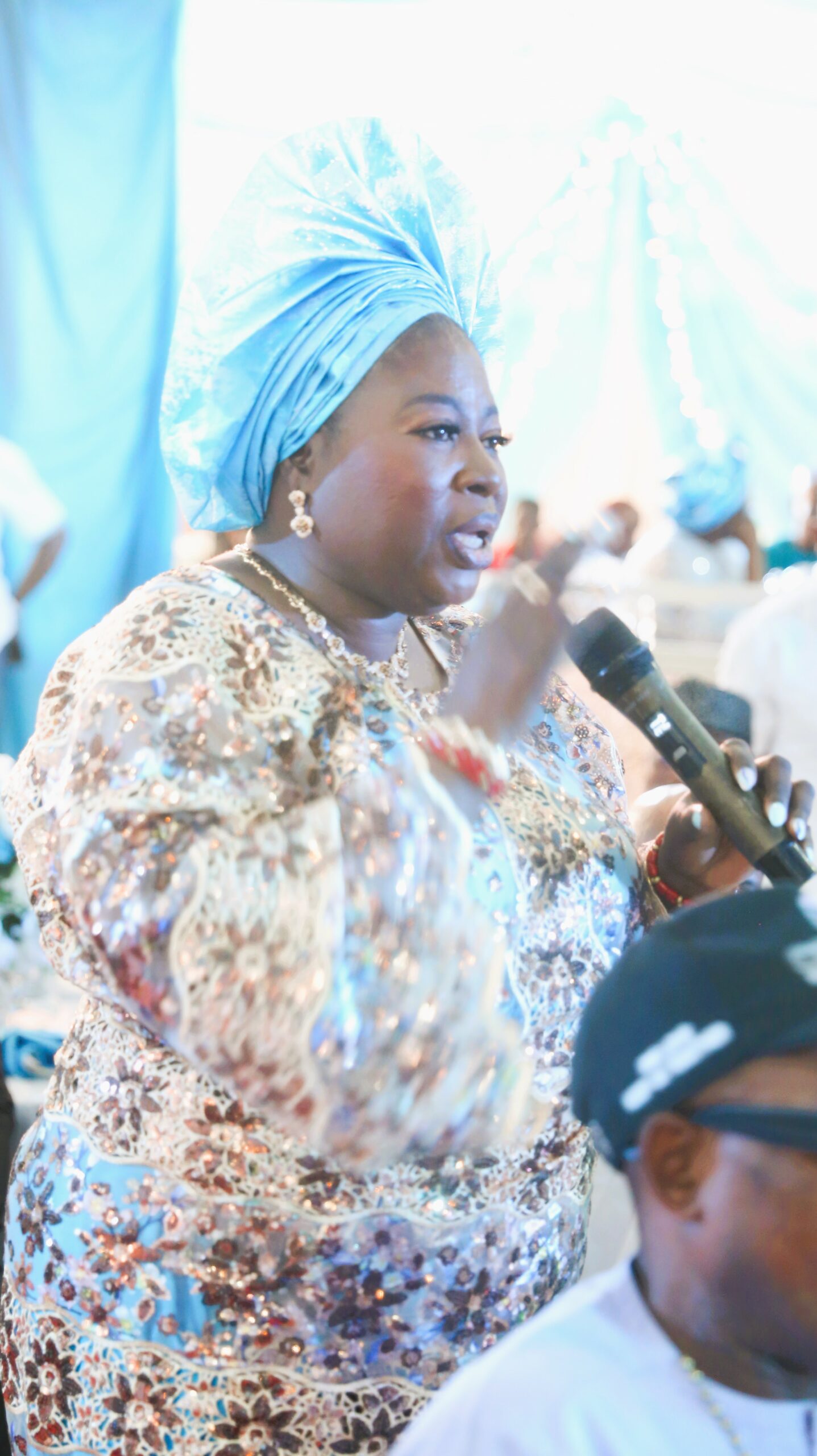Celebrating Seye Kehinde, City People Publisher, at 60
Celebrating Seye Kehinde, City People Publisher, at 60
Tuesday, April 29, 2025 11:54 am
By Nehru Odeh
Mr Seye Kehinde is a journalist with a difference. He sits comfortably in the contrasting worlds of fun and sobriety. And he has made successes in both worlds. Little wonder after he and his colleagues founded TheNEWS in 1993, three years later he established City People, a soft-sell magazine that has made its mark in celebrity and entertainment journalism.
Yet despite his gargantuan achievements, despite the inroads he has made into journalism and the path he has carved, despite his contributions to Nigeria’s socio-political development, he personifies humility.
It was for this and many other reasons that colleagues, friends and family converged on Oranmiyan Hall, Airport Hotel, Ikeja Lagos on Thursday 24 April 2025 to celebrate the man who has done so much for himself and the country, the man who took journalism a notch higher in Nigeria, what with his being part of TheNEWS story and the visioner of a novel kind of eclectic journalism that is the hallmark of City People magazine.
Guests in attendance included: HRM Oba Akintunde Akinyemi, Mrs Julie Coker, Mr Biodun Shobanjo, Mr Kunle Ajibade, Mr Tony Chiejina, Mr Wahab Shittu, SAN, Aare Dele Momodu, Dr Reuben Abati, Mr Kayode Komolafe, Mrs Esther Ajayi, Chief Yemi Elebuibon, Aare Kola Oyefeso and Oloye Lekan Alabi, and Florence Itan Giwa.
It was a day of fun, music and entertainment. It was also a day of tributes as the celebrant’s friends and colleagues paid glowing tributes to him. Legendary 83-year-old musician, Chief Ebenezer Obey and his Inter Reformers Band were on hand to serenade guests at the event.
Mr Babatunde Raji Fashola, SAN, former Governor of Lagos State and former Minister of Works and Housing was the Chairman of the occasion. He also delivered the lecture entitled, “Why I am Optimistic about Nigeria.”
Before delving into his lecture, Fashola was full of praise for the celebrant to whom he said he was indebted and described as a symbol of the Nigerian Dream.
“Ladies and gentlemen we are gathered in honour of a symbol of the Nigerian Dream. Seye Kehinde and many others represent the symbol of the Nigerian Dream, a dream about which a lot is not said.
“But there is a dream there. This is a land where those from the humblest of beginnings have been transformed into national champions and national icons. Let’s think about it. All of the great women and women that you know, how many of them were sons of kings? How many of them were sons of princes? How many of them were sons of emirs and Obas? They came from the humblest beginnings. Many of them.
“Seye Kehinde is one of those many people from ordinary working-class families, who have built things with their own hands in a land that allows them to do so.
“So we gather in honour of Oluseye Olugbemiga Kehinde, better known as Seye Kehinde, an accomplished Nigerian journalist and publisher, the founder of City People magazine, Nigeria’s leading fashion and celebrity publication.
“He is the son of civil servants. He has been committed and dedicated to his chosen profession after receiving an education in Nigeria. He was educated here and has earned his place among the country’s high and mighty. And that is signified by all of the great men and women who are gathered here to honour him today.
“It is a credit to the measure of the man that the magazine he founded in 1996 is still strong and treading waters that have consumed many of her predecessors and even competitors,” Fashola maintained.
In his lecture, Fashola said there were many reasons to be optimistic about Nigeria because there is so much to relish and expect. “Of course, if we took a survey today about whether we should remain optimistic about Nigeria or not, I can only hazard that opinion will be diverse. But mind you, I am speaking about Nigeria,” he noted
However, Fashola bemoaned the fact that Nigerians have not healed from the pains of the past, some of which, according to him, were self-inflicted.
He also wondered why Nigerians are still reaching out seemingly to their ethnic identities, even though they are now intermarrying across ethnic lines.
“The first question I ask is, why have we not healed from our pains? We have some pains, like many people and so many nations. But why have we not healed from these pains? And I suggest indeed some of those pains are self-inflicted.
“We are tying knots of togetherness, while ironically still pulling those knots because I reckon that when those marriages are going to happen, families come together, and embrace one another. And so we are too joined now for some of the rhetoric that I am hearing. We must step away from that rhetoric. And it is on this note that I want to suggest there is something that must be protected here in the Nigerian state. There is something that must be encouraged,” Fashola averred.
Fashola stated four reasons he is optimistic about Nigeria. They are: One, he has an identity. Two, the name, Nigeria, gives him a brand. Three, we have population; and four, the assets of nature and history abound in the land.
He also suggested some don’ts and dos, which he advised Nigerians to follow. They are: “Don’t give up on the Nigerian brand. Don’t disparage the Nigerian brand. We must comply with law and order. We should actively promote the Nigerian brand.
“I think that we are the classic case of an enterprise just too big to fail. We must stop blaming ethnicity and colonialism because the nations that we currently envy have experienced all that and more, and they are thriving. It’s not an excuse,” Fashola said.
However, Fashola’s lecture generated not a few ripples. Nigerian actor, Yemi Shodimu, who was the Master of Ceremonies at the event, said the former governor and minister did not dwell on leadership but was only addressing the people.
“What’s the role of leadership in uniting the people towards achieving a cause? I remember clearly when you were governor in Lagos State, with your performance, with your charisma, all you probably needed was to ask the people to come behind you and let’s get this done. And it would have been achieved. Where is the role of leadership?
Oloye Lekan Alabi waxed nostalgic when he went down memory lane and posited that the Nigeria that gained independence from Britain in 1960 was built on the solid foundation of merit and not whose child you were or who you knew.
His Royal Majesty Oba Akintunde Akinyemi, the Eselu of Iselu Kingdom, asked the guest speaker to look at things critically, adding that though it is good to showcase our country to the best of our ability, what do we do do when things are not right?
“Because if you are suffering and you are smiling, I don’t know how we are going to do that. We are ready to tell the whole world our country is good. Where is the food? Where is free education for our children? What about those who cannot even afford to send their children to public schools, not to talk of the private ones? What about the availability of electricity? Where is the security? That’s why I want to agree with Chief Sodimu that you just beat one side of the coin and you left the other side,” Oba Akinyemi maintained.
Mr Yomi Badejo, Chairman, of Nigerian Reputation Management Group agreed with Fashola’s premise that Nigerians tend to equate government with country. “The most profound thing that you’ve said is that Nigerians are angry with their leaders but they equate it with the anger with their country. Most people like Nigeria. They are passionate about Nigeria. And that is what you see when the football matches are on. But the real thing is that the people are angry with their leaders because they have failed them. I believe it’s work that can still be done. And there is a lot of work to be done there,” Badejo said.
Comrade Funmi Sessy, Chairman of the Labour Party in Lagos State, decried the insecurity that is prevalent in the country. “Insecurity in Nigeria now is another thing entirely. Farmers can no longer go to their farms. People cannot no longer move freely from one place to another. Nothing is being done about insecurity. Many Nigerians that we meet abroad want to come back home. Many people don’t like to japa. But because of the situation in this country, many who came back (ja pada),” she lamented.
More tributes followed the responses to Fashola’s lecture. Otunba Bimbo Ashiru Chairman of Oodua Investment Company Limited, who has known the celebrant for more than 30 years and was at his 30th, 40th and 50th birthday celebrations, described him as deliberate, highly focused, very humble, respectful and very unassuming. Aare Dele Momodu, journalist and CEO of Ovation magazine, for his part, described Kehinde as one of the most prolific writers Nigeria has ever produced, adding that he deserved a bigger round of applause.
However, the high points of the event came when the celebrant and his wife, Funke, cut the birthday cake and the couple, together with their children and other members of their family took to the dance floor as they danced to the melodious sound and rhythm of Chief Ebenezer Obey’s ageless and classic music. And as Obey’s music floats in the air, guests were indeed convinced that the celebrant was a great man, even though he hides this under the veneer of humility.










 3 hours ago
3 hours ago  5 hours ago
5 hours ago  5 hours ago
5 hours ago  8 hours ago
8 hours ago  9 hours ago
9 hours ago  23 hours ago
23 hours ago  1 day ago
1 day ago  1 day ago
1 day ago
Join The Conversation